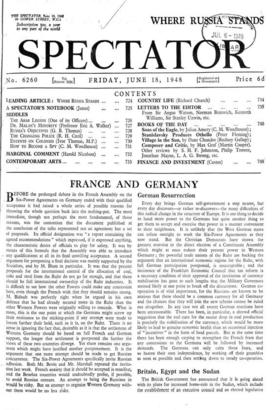FRANCE AND GERMANY
BEFORE the prolonged debate in the French Assembly on the Six-Power Agreements on Germany ended with their qualified acceptance it had raised a whole series of possible reasons for throwing the whole question back into the melting-pot. The most immediate, though not perhaps the most fundamental, of those reasons, was the contention that the document published at the conclusion of the talks represented not an agreement but a set of proposals. Its official designation was " a report containing the agreed recommendations " which expressed, if it expressed anything, the characteristic desire of officials to play for safety. It was by means of this formula that the Assembly was able to introduce any qualifications at all in its final unwilling acceptance. A second argument for postponing a final decision was mainly supported by the Socialists, and by M. Blum in particular. It was that the present proposals for the international control of the allocation of coal, coke and steel from the Ruhr do not go far enough, and that there should be full international ownership of the Ruhr industries. It is difficult to see how the other Powers could make any concession here, even though the French wish that they should remains strong. M. Bidault was perfectly right when he argued in his own defence that he had already secured more• in the Ruhr than the other Western Powers were originally willing to concede. What is more, this is the one point at which the Germans might screw up their resistance to the sticking-point if any attempt were made to loosen further their hold, such as it is, on the Ruhr. There is no sense in ignoring the fact that, desirable as it is that the settlement of Western Germany should be based on full French and German support, the longer that settlement is postponed the further the views of these two countries diverge. Yet there remains one argu- ment which might have justified another postponement. It is the argument that one more attempt should be made to get Russian concurrence. The Six-Power Agreements specifically invite Russian adhesion. Both Mr. Bevin and Mr. Marshall repeated the invita- tion last week. French anxiety that it should be accepted is manifest, and the Benelux countries would undoubtedly prefer, if possible, to avoid Russian censure. An attempt to bring the Russians in would be risky. But an attempt to organise Western Germany with- out them would be no less risky.


































